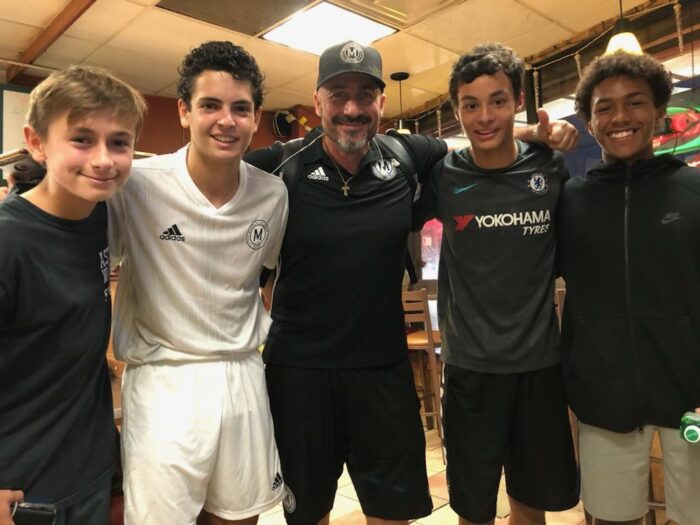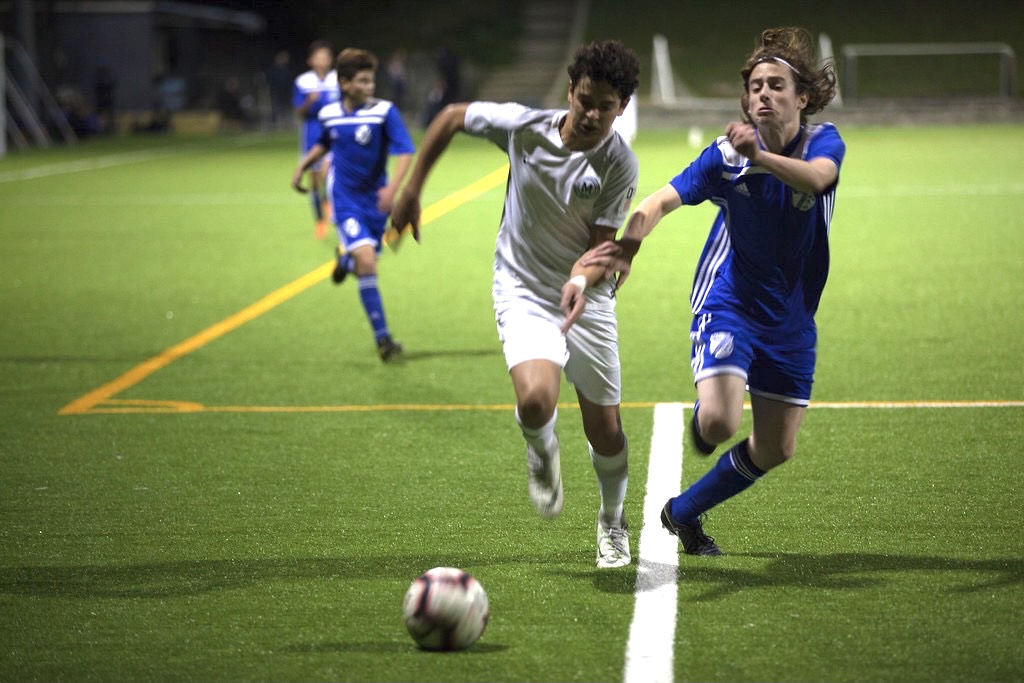Irish soccer news rarely reverberates beyond the island nation’s shores. The summer interim appointment, however, of the 50-year-old Italian Filippo Giovagnoli to coach the Irish Premier League team Dundalk FC is a tale of interest for the entire soccer community. Filippo arrived at Dundalk via the United States youth academy Metropolitan Oval in the New York City borough of Queens. His journey is a story of an American Dream ultimately realized in Ireland.
Allenatore (coach) Giovagnoli
Filippo’s career as a professional soccer player never reached beyond the Italian third division level Serie C. The 6’1” former left back with a shaven head and beard looks like the menacing defender he claims to have been. He once whimsically said of his playing days, “I was an animal as a defender. I was a killer.” Beneath the bravado is a self-aware, intelligent and strategic man not to be underestimated. Ironically, until the appointment at Dundalk his coaching career has always been at the youth level.

Met Oval’s sporting director, Jeffrey Saunders, who has ties to the American ownership group of Dundalk recommended Filippo along with his longtime assistant Giuseppe Rossi to the Lilywhites. The team’s supporters were dumbfounded by the hire. The press described the move as a “left field” and “shocking” appointment. Filippo and Giuseppe were undeterred and in a matter of weeks they righted a team in disarray and improbably led them through qualifying to a group stage berth in the UEFA Europa League.
American Youth Soccer
I know Filippo from the five years my boys played at Met Oval. I can attest to his contention that his youth soccer experience amply prepared him to coach Dundalk. In the States, soccer is overwhelmingly a pay to play affair. Annual fees for Met Oval’s U8 to U19 teams are more than $2000. This excludes uniforms, travel and other sundry expenses. Parents expect a great deal for their expenditure.
The Met Oval players represent the mosaic of the boroughs of New York City and suburban Long Island. On one of my son’s teams, parents cheered their kids on in Portuguese, Spanish, Italian, Polish, Greek, Dutch and English. Some kids are ferried to and from practice by car services while others rush from the pitch as quickly as possible to catch the unreliable Q54 bus, which notoriously runs on its own schedule. Filippo and his coaching staff held this disparate array of people together through an obvious love for the game, expert technical and tactical soccer knowledge, guile, passion and, when needed, a heavy hand.
Met Oval
The location of Met Oval gives the club its identity and character. Aptly, the club is simply named for a nearby street, Metropolitan Avenue; Oval is what many fields at the time of its founding in the 1920’s were called. The pitch is only six miles from midtown Manhattan. Yet driving along its namesake Metropolitan Avenue to the grounds one passes a prison, a junkyard, body shops and other industrial blight far removed from midtown’s gleaming spires.
The entry gate to the pitch is flanked on its north by trees and the tracks of the Long Island Railroad. Modest row houses are to the south. As one pulls into the gravel driveway leading to the parking lot, the pitch is not immediately seen because it sits in a gully.

The initial sight to the west is a panoramic view of Manhattan. Look downtown to the left and the Woolworth Building comes into view. Look straight ahead into midtown and the Empire State Building, the Chrysler Building and the newly erected One 57, one of the tallest residential buildings in the world, fill the skyline. The view would be a tourist attraction to rival the Top of the Rock if it were closer to the city. Parents from visiting teams always ask if the view ever gets old? The answer is always “No!” Met Oval is an oasis amongst the unseeing surroundings and everyday life.
A sixty foot by twenty foot flat-roofed cinder block clubhouse couples the gravel parking lot east of the field. The Met Oval Logo is proudly stenciled on the outside walls. Underscored in bold letters is: Youth Center of Excellence.
The cramped office quarters are lined with white boards to map out game strategies, rosters and schedules. The linoleum floor is perpetually covered with artificial grass and mud from the coaches boots. A few trophies are displayed while others have been given away because of a lack of space. Fans and space heaters do their best to keep the inhabitants as comfortable as possible.

Coaches rarely discard their parkas when they enter the clubhouse after cold December practices. The only luxury is a flat screen TV primarily used to glimpse a soccer match during a rare spare moment. Saunders refers to Daniel Coyle’s book the Talent Code to explain the hidden spirit of Met Oval. Coyle writes, “Luxury is a motivational narcotic. It whispers, Relax, you’ve made it. Talent hotbeds are sometimes called chicken-wire Harvards. Simple, humble spaces help focus attention on deep-practice tasks at hand. When given the choice between luxurious and spartan, choose spartan.” Filippo was right at home.
New Blood
Filippo’s transition to Met Oval may have been more of a challenge than his start at Dundalk. His predecessor was the Brit Paul Buckle, the first coach in 24 years to lead a non-league team to victory over a Premier League team in the English FA Cup. In January 2013 his Luton Town team stifled Norwich 1-0 in spite of a young Harry Kane playing as Norwich’s striker. The Met Oval parents and kids were elated a coach with such a strong pedigree now directed their club. Buckle was fully committed to Met Oval but a sense loomed that he longed to return to the professional ranks in England. Sure enough, in less than a year, he headed home to coach League 2 Cheltenham. Subsequently, Filippo’s arrival was viewed with heavy scrutiny given the thinness of his resume compared to Buckle’s.
As the head of a youth academy, Filippo’s primary charge was to develop talent. The parents, however, were largely fixated on winning games. Age groups were split into blue and white teams. Blue was to comprise the club’s top players and white would be made up of the next level of players. Initially, Filippo ignored this norm and compiled rosters according to a vision known only to him. Grumbles met the email containing each week’s game line-up as people attempted to decipher why their child was matched to his team. Filippo’s only response would be, “Blue, white, what difference does it make? Just play the game.” In probably his only nod to parent dissatisfaction, Filippo eventually bowed to the norm, designating the blue team as his strongest and white as the second best.
Dissension
The tiering of teams only created a new problem because parents were asked to mark their child’s availability for the blue and white games even though they had a designated team. Unfortunately, this also encouraged one parent to attempt to game the system and only mark his child available for the blue matches even through his kid was firmly rooted on the white team. Filippo immediately sniffed out stunt. He subsequently placed the child permanently on the blue team but barely played him. Filippo knew a non-believer was in his midst. The father realized his colors were discovered and quit the club.
Two years later the child returned with his new team for a match against Met Oval. The father anxiously watched the teams battle to a 2-2 draw that saw Met Oval level the score in the waning minutes. As he despondently walked to his car, he crossed paths with a woman giddy from the exciting game and called her a fat pig. The situation nearly came to blows as a Met Oval father demanded an apology. Filippo’s intuition about the man was confirmed.
Early in Filippo’s Dundalk tenure, team captain Brian Gartland offered his assessment of Filippo and Giuseppe. Gartland was actually impressed. “On the first day Filippo addressed the players. He told us what he wanted, how he wanted us to do it and told us the plan. They’re confident, organized, structured and know what they want.”
Filippo’s approach is reminiscent of lessons out of my Management of Organizational Change classes from business school or the FIFA Pro License study guide. Who needs stinking licenses? Passion and commitment are Filippo’s lodestar. A person driven by these qualities is bound to figure it out.
Buy In
At Met Oval, Filippo and Giuseppe periodically addressed the parents and explained their vision for the club’s teams. At the end of each fall and spring season, the players received an assessment called TIPS: Technical, Insight, Personality and Speed. The evaluation is based on the methodology popularized by the famed Dutch Academy, Ajax. It gave substance to the coaches’ observations.

The coaches spoke of the curriculum and expectations they had for their players with the same intent and seriousness as teachers addressing parents at parent/ teacher conferences. They taught us the importance of technical development and why they would wait until the boys were U13/U14 before they began to emphasize tactics. Many people fail to recognize that youth coaches need to be able to work well with adults as well as kids. The parents have to be sold before they sign the kids up for the program.
Any Dundalk fan who has watched Filippo and Giuseppe coach clearly sees the passion they bring to their jobs. Their animated sideline histrionics are already legendary. They expressed the same enthusiasm at Met Oval when they coached games only a few people watched and even fewer would remember.
One of my favorite memories was a U12 game where Filippo was on the sideline as an observer to support a young new coach. The game started off poorly. The boys were not in synch. They were lethargic and unmotivated. Filippo was agitated but respected the young coach’s dominion. The young coach silently observed each errant pass and weak run. He clearly embraced the lessons from his licensing classes, which taught coaches to let young players figure out solutions to the problems in a game on their own. Don’t shout instructions. The kids should learn by trial and error. Let them play the game without influence from you. Winning isn’t important. The process is key.
The boys were down 0-2 at the half and Filippo was furious—not at the boys, at the coach. One trait Filippo demanded was desire. He passed the same licensing courses but he clearly did not subscribe to the entire curriculum. He believed players derived energy from their coach. Unimpassioned leadership was intolerable regardless of what the licensing committee deemed appropriate.
Dai! Dai! Dai!
Filippo’s face bore the pain he felt for the boys as they played far below their potential. As the second half began, the reins he placed on himself in the first half slowly loosened. At first, he subtly motioned for a defender to play farther up, a winger to fill a lane. One could clearly see his hesitance to interfere but he could no longer contain himself. Next, words of encouragement from Filippo began to pepper the pitch. The young coach remained mute. Met Oval scored midway through the half. It was 1-2. Filippo and the boys were encouraged.
As the boys played better, Filippo became more engaged. His trademark “Dai! Dai!” (come on, let’s go) echoed throughout the field. His discretion gave way to animation. Filippo began to wave the boys along the pitch as if his movements would lift them to the spot he wanted them on the field.
The boys began to win the 50/50 balls they weren’t even close to in the first half. Suddenly, the score was level. The parents became excited, Filippo was in full form and the boys were now playing with passion. Honestly, I can’t remember if the boys won this game. What mattered most was the unbound energy and joy Filippo instilled in them. Filippo may have even said they played like animals. So much for FIFA licenses.
Filippo met the press on the second day he took the helm at Dundalk. Rumors swirled that the ownership team would interfere with his team selections. When asked whether he would allow his authority to be undermined should any board member attempt to influence team matters, Filippo firmly replied, “This is not the deal that we have. No, I’m not going to take words. I’m the boss.” He channeled José Mourinho, or anyone else exceptional at his or her craft.
Filippo knows soccer. He doesn’t need help to do his job. He doesn’t refer to a manual for guidance. He told anyone who questioned his decisions while at Met Oval, “The field speaks.” Filippo hears the field as clearly and effectively as anyone in the business. He is a testament to hard work and belief in one’s self. The kids and parents at Met Oval will miss him. Dundalk is lucky to have him as their new head coach.
